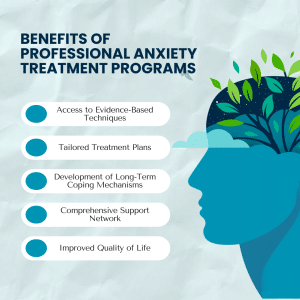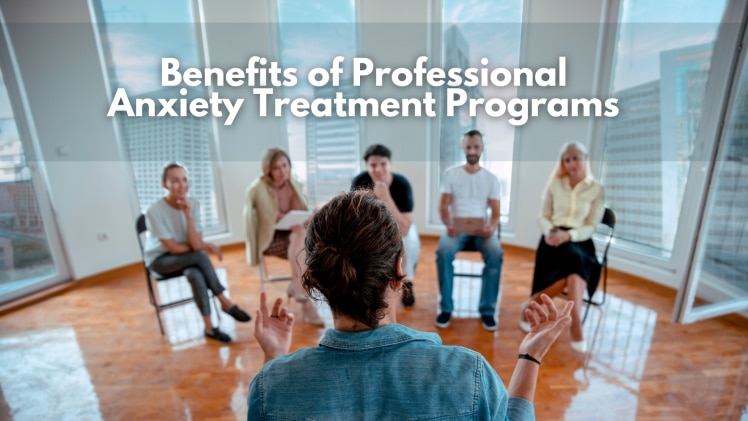One-size-fits-all solutions don’t work for anxiety. Every individual experiences anxiety differently, requiring tailored approaches to address the root causes and alleviate symptoms effectively. Professional anxiety treatment programs provide targeted solutions, empowering individuals to regain control of their lives.
This blog explores the benefits of these programs, underscoring the importance of effective anxiety management through professional care.
Understanding Anxiety and Its Impact
Anxiety disorders, ranging from generalized anxiety disorder (GAD) to social anxiety, are among the most common mental health challenges in the U.S. According to the Anxiety and Depression Association of America (ADAA), about 40 million people in the United States are affected by anxiety disorders. However, only 36.9% of these individuals receive anxiety treatment.
Living with anxiety can be a constant state of worry, physical discomfort, and difficulty maintaining relationships or work-life balance. When anxiety goes untreated, it may affect both emotional and physical well-being, highlighting the necessity of structured care.
Key Benefits of Professional Anxiety Treatment Programs
1. Access to Evidence-Based Therapies
Professional anxiety treatment programs make use of scientifically proven methods such as cognitive-behavioral therapy (CBT), mindfulness-based stress reduction, and exposure therapy. Such treatments tackle not only symptoms but also the underlying thought patterns that bring about anxiety. For instance:
● Cognitive-Behavioral Therapy (CBT): The gold standard in the treatment of anxiety, CBT enables individuals to confront and challenge negative thought processes. According to the National Institute of Mental Health, it has been shown that with CBT, individuals have the ability to change thought processes and behaviors, which also results in symptom relief for patients diagnosed with GAD.
● Mindfulness Techniques: Through these techniques, one learns the art of staying in the present moment. This eradicates feelings of being overwhelmed. Mindfulness-based therapies research has been shown to significantly reduce the symptomatology of anxiety and elevate emotional well-being.
● Exposure Therapy: Particularly effective for phobias, this approach gradually reduces fear responses through controlled exposure to anxiety triggers. Studies show that exposure therapy can lead to long-term improvements in anxiety symptoms, helping individuals face their fears gradually and with support.
2. Tailored Treatment Plans
No two individuals face anxiety the same way, making personalized care a cornerstone of effective anxiety management. Professional courses undertake thorough assessments in developing an individually tailored treatment plan for participants that reflects their specific needs and objectives.
This personalized strategy promotes the possibility of achieving more, as individuals face identified specific triggers and challenges. The duration of therapy varies based on the type and severity of your anxiety disorder. However, many anxiety treatments are relatively short-term. The American Psychological Association states that significant improvement often occurs within 8 to 10 therapy sessions.
3. Development of Long-Term Coping Mechanisms
Although anxiety may never be totally “cured,” professional programs equip individuals with very effective, practical strategies to better control it. Coping skills such as breathing exercises, journaling, and progressive muscle relaxation enable an individual to overcome stressful situations with confidence. Skills learned in therapy can translate into real life, keeping individuals emotionally stable for years after the end.

4. Comprehensive Support Network
Engagement in professional anxiety treatment programs exposes one to a support network of therapists, counselors, and fellow participants. For instance, group therapy sessions provide an opportunity to share experiences with others and learn from them to feel a sense of belonging.
This support network reduces the feeling of isolation and encourages the recovery journey. Studies highlight that group therapy can improve social support and reduce anxiety symptoms, especially when combined with individual therapy sessions.
5. Improved Quality of Life
Effective management of anxiety improves a person’s quality of life in several ways. Professional programs allow the alleviation of such debilitating symptoms that can destroy a person’s joy in his daily activities, ruin his relationships, and hinder personal and professional goals.
As an example, a study in the Journal of Clinical Psychology concluded that treatment for anxiety is associated with positive changes in both psychological well-being and functional life outcomes.
The Importance of Seeking Professional Care
Limitations of Self-Guided Methods
Self-help techniques, whether web-based resources or mindfulness apps are helpful but insufficient for severe or chronic anxiety. Professional help is often necessary because, without professional guidance, patients cannot even easily identify root causes or implement helpful strategies.
Professional care accomplishes this by bridging the gap through structured, goal-oriented treatment plans. This study further indicated that while self-help methods can prove helpful, such is never a replacement for professional treatment, especially since it will be required more if the problem is more pronounced.
Combating Stigma Around Treatment
Despite the widespread occurrence of anxiety disorders, most people avoid treatment because of stigma or misconceptions. Professional anxiety treatment programs actively work to normalize seeking help, emphasizing that it is a sign of strength, not weakness. These programs, therefore, encourage people to take the first step toward recovery by creating a supportive environment.
Exploring Anxiety Therapy Options
Professional anxiety treatment programs offer various modalities to suit individual needs:
One-to-One Counseling
The therapist spends one-on-one time with the client, working together to identify their unique experiences, triggers, and challenges with anxiety. It is geared towards developing specific strategies for managing symptoms of anxiety and achieving emotional well-being. Some of the common therapeutic approaches include Cognitive Behavioral Therapy (CBT), Acceptance and Commitment Therapy (ACT), and Psychodynamic Therapy.
Group Therapy
According to The Journal of Anxiety Disorders, a review indicated that the effectiveness of group therapy is as efficient as individual therapy in dealing with anxiety conditions, especially for clients with difficulties in motivation or commitment towards therapy.
A form of treatment that comprises several individuals who periodically attend and discuss their problems in common while providing mutual support among the individuals in attendance. It provides people an avenue to share experiences, give and receive mutual support, and establish relationships. This approach of therapy is particularly useful for a person suffering from social anxiety disorder or phobias as this offers them the chance to practice their social skills in a safe and controlled environment.
Holistic Approaches
Holistic approaches use various therapeutic techniques aimed at reaching the mind, body, and spirit. Examples include yoga, acupuncture, art therapy, and meditation, among others, that balance emotions, reduce stress, and provide general wellness. Some people choose yoga because it involves physical movement along with mindfulness practices that can help one handle stress and anxiety
Medication Management
For patients with severe symptoms of anxiety that impair their daily functioning, medication management might be required. Medications include antidepressants, benzodiazepines, or SSRIs prescribed under professional supervision, which modify brain chemistry to better ease the symptoms of anxiety. These are often given in combination with therapy for an all-rounded treatment approach. The variety of options ensures that everyone finds a method that works for their preferences and goals.
Conclusion
Professional anxiety treatment programs do much more than just provide relief from the symptoms. They provide an avenue toward empowerment, resiliency, and quality of life. Combining evidence-based therapies, personalized care, and support networks, these programs have the precision to address complexities in anxiety in a compassionate manner.
If anxiety is interfering with your life, then consider professional anxiety treatment. Seeking help is a proactive step toward effective anxiety management and a brighter, more fulfilling future.
FAQs
How effective are professional anxiety treatment programs compared to self-help strategies?
Professional anxiety treatment programs are generally more effective than self-help strategies because of their structured approach and personalized care, which can lead to greater symptom relief and improved long-term outcomes.
What role do medications play in treating severe anxiety symptoms?
Drugs can successfully manage severe symptoms of anxiety if used under the appropriate prescription and monitoring by a healthcare provider, especially when incorporated with therapy to enhance treatment outcomes.
Can holistic approaches replace conventional therapy for anxiety?
Holistic approaches like yoga or acupuncture, cannot replace traditional therapy for anxiety but are meant to complement therapy. While these methods might enhance the relaxation and reduction of stress, their effectiveness lies best in conjunction with therapy.


